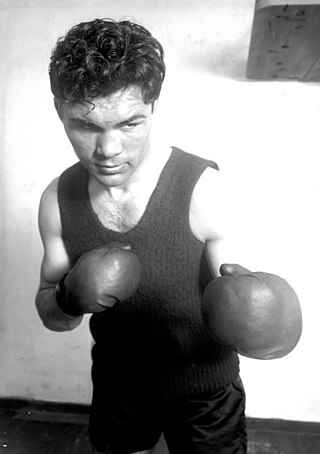
Maximilian Adolph Otto Siegfried Schmeling was a German boxer who was heavyweight champion of the world between 1930 and 1932. His two fights with Joe Louis in 1936 and 1938 were worldwide cultural events because of their national associations. Schmeling is the only boxer to win the world heavyweight championship on a foul.

Joseph Louis Barrow was an American professional boxer who competed from 1934 to 1951. Nicknamed "the Brown Bomber", Louis is widely regarded as one of the greatest and most influential boxers of all time. He reigned as the world heavyweight champion from 1937 until his temporary retirement in 1949. He was victorious in 25 consecutive title defenses, a record for all weight classes. Louis had the longest single reign as champion of any boxer in history.

Emile Alphonse Griffith was a professional boxer from the U.S. Virgin Islands who won world titles in three weight divisions. He held the world light middleweight, undisputed welterweight, and middleweight titles. His best-known contest was a 1962 title match with Benny Paret. Griffith won the bout by knockout; Paret never recovered consciousness and died in the hospital 10 days later.
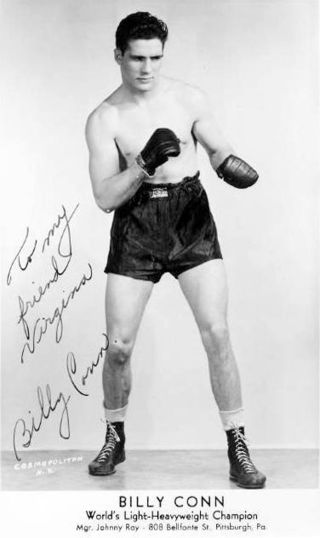
William David Conn was an American professional boxer and Light Heavyweight Champion famed for his fights with Joe Louis. He had a professional boxing record of 63 wins, 11 losses and 1 draw, with 14 wins by knockout. His nickname, throughout most of his career, was "The Pittsburgh Kid." He was inducted into the International Boxing Hall of Fame in the inaugural class of 1990.

Primo Carnera, nicknamed the Ambling Alp, was an Italian professional boxer and wrestler who reigned as the boxing World Heavyweight Champion from 29 June 1933 to 14 June 1934. He won more fights by knockout than any other heavyweight champion in boxing history.

Maximilian Adelbert Baer was an American professional boxer and the world heavyweight champion from June 14, 1934, to June 13, 1935. He was known in his time as the Livermore Larupper and Madcap Maxie. Two of his fights were rated Fight of the Year by The Ring magazine. Baer was also a boxing referee, and had occasional roles on film or television. He was the brother of heavyweight boxing contender Buddy Baer and father of actor Max Baer Jr. Baer is rated #22 on The Ring magazine's list of 100 greatest punchers of all time.

The sport of Boxing in the 1930s was affected by one of the biggest economic struggles in the history of the United States: the depression era. Because of the suffering American economy, many boxers were offered lower amounts of money causing them to only box for passion. When the decade began, the world heavy weight title belonged to no one. The sport of boxing suffered because of the lack of money to pay the boxers.
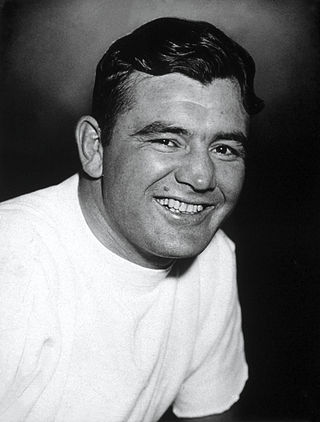
James Walter Braddock was an American boxer who was the world heavyweight champion from 1935 to 1937.

Jack Sharkey was a Lithuanian-American boxer who held the NYSAC, NBA, and The Ring heavyweight titles from 1932 to 1933.
Joe Louis vs. Max Schmeling refers to either of two separate fights between the two boxers which are among boxing's most famous bouts. Schmeling won the first match in 1936 by a knockout in round 12 and Louis won the second bout in 1938 with a knockout in the first round.

Dominick Anthony Galento was an American heavyweight boxer. He is best remembered for scoring a third-round knockdown against Joe Louis in a world title stoppage loss in June 1939. Active from the late 1920s to the early 1940s, he compiled a record of 79 wins, 26 losses, and 6 draws. Besides Louis, Galento fought against several other prominent heavyweights of his era—including Al Ettore, Arturo Godoy, Lou Nova, and Max and Buddy Baer. Though assumed by some sportswriters to have been a reference to his "pulchritude" or physical appearance, Galento's nickname, "Two Ton", was apparently derived from his work as an iceman: a job he pursued in tandem with his pugilistic career. On one occasion, as a result of his ice-lugging commitments, Galento was reportedly upbraided by his cornerman for being late for a bout. "Take it easy", the New Jersey-born slugger reputedly replied to his colleague's complaint, "I had two tons of ice to deliver on my way here. I'll be right up." In addition to "Two Ton", Galento was also known as the "Jersey Nightstick", the "TNT Kid", the "One-Man Riot", the "Orange Orangutan", and the "beer barrel that walks like a man". The boxing historian Bert Sugar called him a "human butcher block".
Tom O'Rourke was born in Boston and became a boxing manager in the late nineteenth and early twentieth centuries.
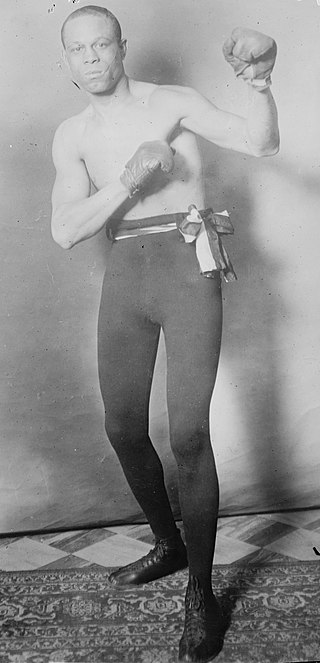
Charles Henry "Jack" Blackburn was an American boxer and boxing trainer. Fighting in the first half of his career as a lightweight and later a welterweight, he was known for an exceptional defense and fought many men above his weight class, including six bouts with the great Sam Langford. He fought Joe Gans three times in no-decision bouts, defeating him once according to newspaper accounts and made good showings against Harry Lewis, Philadelphia Jack O'Brien, and Harry Greb. He found most of his fame training 1937 World Heavyweight Champion Joe Louis, but also had a significant role in training 1926 Lightweight Champion Sammy Mandell. He helped to train World Bantamweight Champion Bud Taylor and World Light-Heavyweight Champion John Henry Lewis as well.
Leon Major is a Canadian opera and theatre director. He is the Artistic Director of The Maryland Opera Studio for the University of Maryland, College Park. From 1998-2003 he was Artistic Director of Boston Lyric Opera and from 2003–2007 he was artistic consultant for Opera Cleveland.

Michael Strauss Jacobs was a boxing promoter, arguably the most powerful in the sport from the mid-1930s until his effective retirement in 1946. He was posthumously elected to the World Boxing Hall of Fame in 1982, and the International Boxing Hall of Fame in 1990.

Max Schmeling is a 2010 German biographical film directed by Uwe Boll. The film tells the story of German boxing icon Max Schmeling. It was released abroad under the title Max Schmeling: Fist of the Reich.
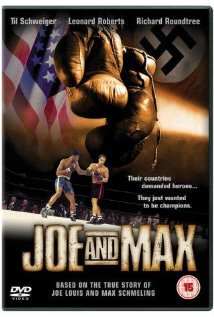
Joe and Max is a 2002 American-German boxing film directed by Steve James and based on the true story of the two boxing matches between American Joe Louis and German Max Schmeling.

Hranoush Sidky Bey, better known as Madame Bey, also Hranuş Sıdki Hanım, was an American boxing trainer. She ran a boxing camp for world champion boxers in Chatham Township, New Jersey, in the United States. Her life and boxing camp are documented in the book Madame Bey's: Home to Boxing Legends. Her prominence during the time she operated her boxing camp from 1923 to 1942 is documented in the thousands of press photos taken at her camp. Forgotten today, her camp's namesake was an everyday occurrence in sports sections of newspapers.
John James Phelan was an American boxing commissioner and military officer who served as chairman of the New York State Athletic Commission and was a Major General in the New York Army National Guard.















